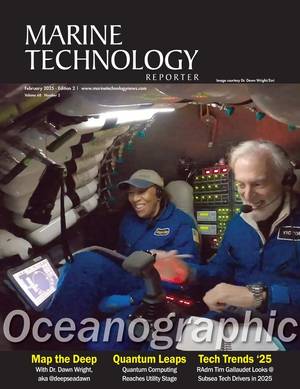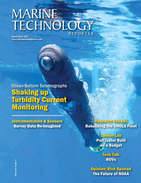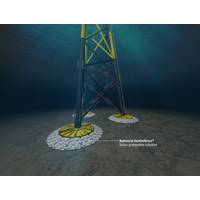
Balmoral Launches HexDefence System for Offshore Wind Jacket Foundations
in which we work, HexDefence will be produced close to development sites. This strategic choice not only increases local content but also contributes to the overall sustainability of offshore wind projects by reducing environmental impact.”HexDefence Aims to Protect Offshore Wind Assets, Cradle to Grav
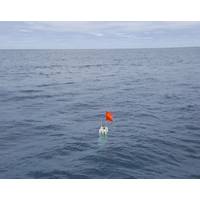
Reader Feedback: Lander Lab - Buoyancy
pretty fast. After she submerged, the wood corks would float up and plug the holes so the tanks would hold air after she came back up.“Back at NEL, after all the Av gas was pumped out, we would take the ‘scaphe back to our quay, where we would lift it up with that big crane onto its cradle. “There was still around 300 gallons left in the buoyancy tanks. I made the valves that fit on the low point of each tank. They had a garden hose fitting on the bottom, so we didn’t have to mess around looking for a special hose. We’d open each of these and

MASSA: Innovation Inside its DNA
ultrasonic products for use in the water and air, selling to commercial, industrial and military markets.At a glance, Massa is an engineering and invention company to its core. But once you dig deeper, it is far more, with the ability to discuss, design and manufacture products for disparate industries, cradle to grave, all centered on using an electroacoustical solution. Massa designs, develops, and manufactures new and modified products, hundreds of transducers and systems that operate in fluid and gas at different frequencies spanning from 5 Hz to 500 kHz; used in various environments and applications
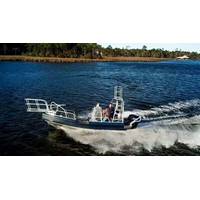
Silver Ships Delivers RHIB to NOAA Research Fish Biologist Team
to be operated from NOAA oceangoing ships. At just under 28 feet in length, with a hull length of 20’ 5’’, this vessel is powered by two Mercury SeaPro 115hp, with an 80-gallon fuel tank, along with an 8’ 10’’ beam, 22’’ draft, a trailer, and a boat cradle for deck storage to make this custom vessel meet the needs for NOAA.Ambar series vessels, part of the rigid hull inflatable boat (RHIB) family, were originally designed to meet the demands of the North Sea as rescue boats. Over the past 15 years, the Ambar boats have been used in many applications
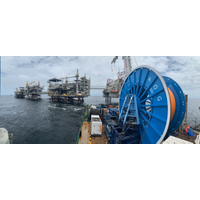
Strohm, Petronas Partner Up to Commercialize Thermoplastic Composite Pipes
on the cost and schedule risk associated with vessel standby and onshore rigid spool fabrication."A logical step forward from the single jumper application is Strohm’s ‘Jumper on Demand’ concept, whereby a long length of pipe is fabricated and stored on a single reel or cradle, ready to be cut and terminated in-country into individual jumpers as required," Strohm said,Fabienne Ellington, Strohm’s Vice President, Middle East and Asia-Pacific, said: “We are very excited to take this next step together with Petronas. Their visionary spirit recognised at an
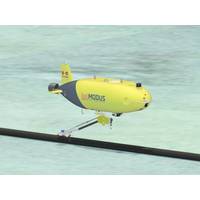
Subsea Vehicles: To Be (resident), or Not to Be?
(in low sea states), with a simple over boarding system such as a small crane with remote release, and a smart grabber for recovery. This has been used for inter-array cable depth of burial surveys and cable surveys in Europe.It then has a “floating dock”, where the vehicle is launched in a cradle over the side, using a subsea crane. The vehicle drives out of the dock, avoiding a need for heave compensation systems. At the end of a mission, it’s driven back in using a Wi-fi connection to it from the vessel, for recovery. This has been used on pipeline and platform inspections in Australia
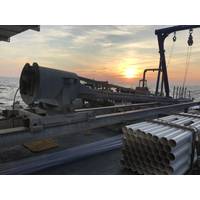
GOM Geotechnical Coring Program Completed for NOAA OER Expedition
desired initial force on impact, and a sliding piston inside the core barrel to reduce inside wall friction with the sediment and to assist in the rapid evacuation of displaced water from the top of the corer.Once the sample is collected, the entire rig is pulled to the surface and placed back into its cradle, which is then recovered on deck. The cutter head and core catcher are removed from the barrel and the liner removed for inventorying and sectioning. We rinse and bag anything from the core catcher and drill bit, but our only other opportunity to see what we might have comes when we section the 6-
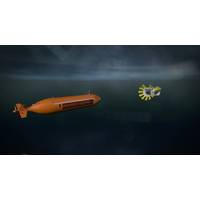
Kongsberg Develops New LARS for HUGIN AUVs
LARS. It is flexible with regards to placement – although midships is optimal – and can be operated from anywhere onboard, including the stern. It may also be installed higher than on the main deck, to accommodate the vessel layout, Kongsberg says."For deployment and recovery, the LARS cradle is lowered into the water to a pre-determined depth. It is positioned safely below the splash zone and propeller wash, enhancing both the weather window and safety and is heave-compensated to stabilize the effect of waves and ship movement. Once in the water, HUGIN is released to start its mission
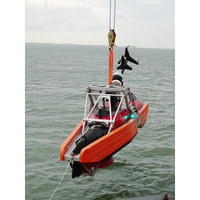
Next Gen LARS for Fugro's New L3-ASV
and fender modules are of a closed cell high density foam, with a special spray-on coating which allows the LARS to absorb and withstand high “slamming” impact loads with the mother vessel during launch and recovery operations in rough weather conditions.A modular designed LARS storage cradle removes the need for large sea fastening or expensive modifications to vessel decks and allows all systems, including the ASV, to be transported using a standard 40ft. ISO shipping container.“Fugro’s design requirements has forced us to think outside the box resulting in a lightweight
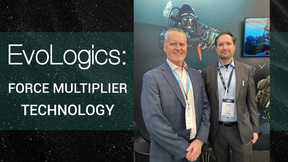
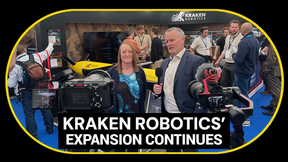
 February 2025
February 2025
